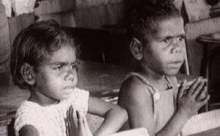
VARASTETUT ELÄMÄT
 "Oli vaikea totutella olemaan ilman tähtiä", muistelee Bob Randall elokuvassa Varastetut elämät. Bob oli yksi niistä noin 100.000 alkuperäiskansojen lapsista, jotka lain voimalla vietiin vanhemmiltaan. Alle kouluikäisiltä lapsilta riistettiin heidän kulttuurinsa ja kielensä, kun heitä yritettiin eurooppalaistaa.
"Oli vaikea totutella olemaan ilman tähtiä", muistelee Bob Randall elokuvassa Varastetut elämät. Bob oli yksi niistä noin 100.000 alkuperäiskansojen lapsista, jotka lain voimalla vietiin vanhemmiltaan. Alle kouluikäisiltä lapsilta riistettiin heidän kulttuurinsa ja kielensä, kun heitä yritettiin eurooppalaistaa.
"Rotuhygieniaohjelmalla" pyrittiin karsimaan eurooppalaisittain huonot ominaisuudet, mikä edellytti rodun jalostamista. Rodunjalostaminen tähtäsi koko kansan hävittämiseen.
Dokumentissa historioitsijat kertovat teorioista, riiston kohteet käytännöstä. Dokumentti on surullista katsottavaa, sillä vaikka laki kumottiin 1967, ei pääministeri John Howardin konservatiivihallitus ole esittänyt virallista anteeksipyyntöä, vaikka maailman mielipide sitä vaatiikin. "Elämässäni on ollut vain muutama kerta, kun olen hävennyt kansalaisuuttani. Tämä oli yksi niistä", kertoo yksi leireillä työskennellyt lähetystyöntekijä, kun pääministeri oli esittänyt vain henkilökohtaisen anteeksipyynnön.
Elokuvan haastateltavat kertovat yksinäisyydestä, pelosta ja oudoista tavoista. Alkuperäiskansoille perhe oli ehdottoman tärkeä ja tämän päivän aikuiset muistelevat, miten he joutuivat kesken leikkiensä siepatuiksi leireille, joissa nunnat ja vapaaehtoiset lähetystyöntekijät heitä hoitivat.
"Meidät puettiin joka päivä kauniisti, sillä joku saattaisi tulla valitsemaan lapsen itselleen. Kuin kaupasta", kertoo yksi haastateltavista.
- Ohjaaja: Darlene Johnson
- Tuotanto: Jotz Productions, Australia, 2000
In English In English In English
THE STOLEN GENERATION
 It is estimated that loo,ooo children across Australia were forcibly removed from their families simply because they were Aboriginal. This practice started in the first days of European occupation in Australia and continued into the 197o's. It was sanctioned by law and not one Aboriginal family escaped its legacy.
It is estimated that loo,ooo children across Australia were forcibly removed from their families simply because they were Aboriginal. This practice started in the first days of European occupation in Australia and continued into the 197o's. It was sanctioned by law and not one Aboriginal family escaped its legacy.
The policy was to segregate the "inferior" black race so it would die out and assimilate the "half caste" into the "superior" white society. Thousands were forcibly removed to homes run by missionaries where they suffered physical cruelty, sexual abuse and basic lack, of affection. They were not allowed to speak their. traditional tongue or practice their own culture. They became a subhuman race useful only as hired labour to be sent out to work as domestic servants and stockmen on cattle stations which had taken over what were once their homelands.
The film will be told by the survivors of the Stolen Generation. We will hear from people, who, as children, were brutally removed from their families, rounded up and transported from one side of the country to the other. We will also hear stories of resistance - how mothers smeared their children with black clay, hid them in trees, behind sand dunes, in hollow logs, or were constantly 011 the move to avoid "The Welfare". Passing for. white also became a common strategy for survival.
THE STOLEN GENERATION will bring home the long-term effects - the unresolved trauma and grief, the alcoholism and suicide, and the loss of indigenous identity, culture and language. It will also tell the stories of reunion between stolen children and surviving parents - both joyous and painful.
- Director: Darlene Johnson
- Production: Jotz Productions, Australia, 2000

Päivitys: 14.9.2000 U.E.